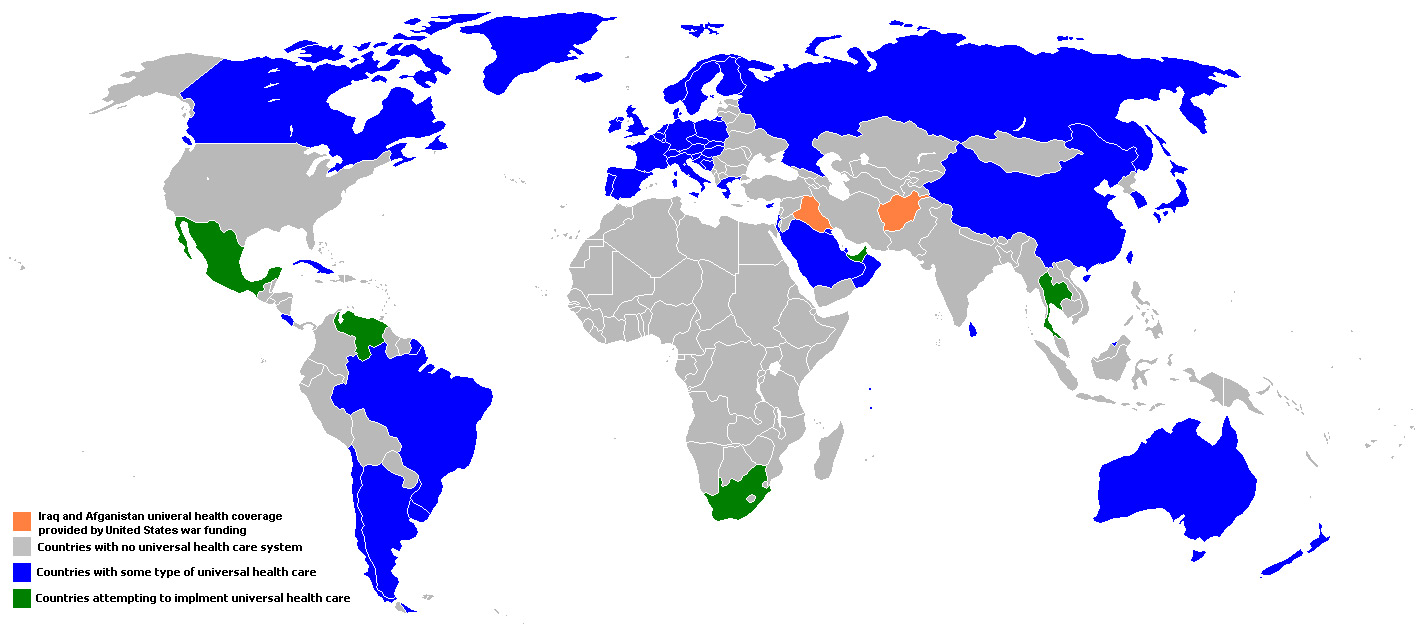|
|
|
|
A CIGAR SOCIETY FORUM ON
Universal Health Care
Featuring a Distinguished Panel of Physicians, Lawyers, and
Cigar Society Members
Tuesday, April 15, 5:30-8:30pm
The
Lounge at Iwan Ries, 19 South Wabash
Cocktails at 5:30, presentation 6:00-6:30
followed by discussion and more cocktails.
$40 includes drinks, two cigars, and sandwiches.
Reservations
are required.
|
|
|
 |
'In 1947 our thirty-third president, an insightful man of
egalitarian perspective, tried to introduce universal health
care to America. The American Medical Association opposed
this initiative and hired a Chicago PR firm to mount a
campaign to thwart it. The PR firm coined the politically
pejorative term “socialized medicine” capitalizing on the
cold war sentiment of the age. Since 1947, the term’s
political meaning has been broadened to apply to any
publicly funded health care system.
'Socialized medicine and universal health care need not be
one and the same thing. France provides universal health
care through a publically funded system. Germany provides
universal health care through a privately funded system.
Uniquely, according to the Institute of Medicine, the United
States is the only wealthy, industrialized nation that does
not provide universal health care.
'In the United States, health care is largely considered an
economic commodity. Those who can afford it buy health care;
those that can’t, don’t. There are of course exceptions and
safety nets in the United States.
'Nineteen million Americans receive subsidized or socialized
health care through the Veterans Administration, the Armed
Services and the Office of Indian affairs. These are
government-run hospitals, government pharmacies, and
government paid doctors, nurses, and other medical staff.
Health care to our military both active and retired is
considered to be a good and timely service.
'Forty-nine million Americans are on Medicare, another form
of socialized medicine. Though it has its shortfalls,
Medicare is the most highly regarded of all insurance
programs in America.
'The majority of the 260 million people who populate the
United States and are not covered by Medicare and the VA
must pay for their health care. The United States spends 17
cents out of every dollar of our gross domestic product on
health care. Japan spends 8% of GDP on health care, England
9%, Germany 11% and Switzerland 12%. These latter countries
provide universal health care.
Life expectancy at birth in the US is 77 years. In Japan it
is 82 years, England 79, Germany 79 and Switzerland 81.
Infant mortality in the US is 7 per 1000 live births. In
Japan infant mortality is 2.8 per 1000, England 5.1, Germany
3.9 and Switzerland 4.2. A more striking statistic is that
last year 25,000 Americans died of treatable diseases
because they couldn’t afford health care. These Americans
would not have died if they lived in the Netherlands,
Belgium, France, England, Germany, Japan or most other
industrialized democracies in the world.
'Our forum will consider whether Universal Health Care is
realizable in America and what the major obstacles are.'
—David O'Connor

Jorge del Castillo is Associate Head, Department of
Emergency Medicine, Northshore University Health System and
clinical associate professor, Pritzker School of Medicine,
University of Chicago. He has authored many articles and
book chapters in the discipline of Emergency Medicine. He
has an MBA from Northwestern University, an MD from the
Chicago Medical School, and a BS from Rutgers University.

Abe Kocheril is a recent presenter to the Cigar
Society: “The Positive Implications of Music, Wine, and
Cigars”. He is Director of Cardiac Elecrophysiology and
professor of medicine at the University of Illinois, and was
Director of Clinical Cardiac Electrophysiology at UIC. He
has an MD from the New York University School of Medicine
and an AB is chemistry and religious studies from New York
University.
 Steve
Nellemann is Associate General Counsel at
WellPoint, a health insurance company. He has been Senior
Counsel at the American Medical Association, Counsel at
Corporation X Development, and Corporate Counsel at BAA. He
has an MBA from the University of Chicago, an MS in
informatics from Northwestern University, a JD from DePaul
University College of Law, and a BS in psychology and
classics from the University of Illinois at
Urbana-Champaign. Steve
Nellemann is Associate General Counsel at
WellPoint, a health insurance company. He has been Senior
Counsel at the American Medical Association, Counsel at
Corporation X Development, and Corporate Counsel at BAA. He
has an MBA from the University of Chicago, an MS in
informatics from Northwestern University, a JD from DePaul
University College of Law, and a BS in psychology and
classics from the University of Illinois at
Urbana-Champaign.
|
|
|
|
|
|
About
the Cigar Society of Chicago
ONE OF THE OLDEST AND greatest
traditions of the city clubs of Chicago is the discussion of
intellectual, social, legal, artistic, historical, scientific,
musical, theatrical, and philosophical issues in the company of
educated, bright, and appropriately provocative individuals, all
under the beneficent influence of substantial amounts of tobacco
and spirits. The
Cigar Society of Chicago embraces this tradition and
extends it with its Informal Smokers,
University Series lectures, and Cigar Society Dinners,
in which cigars, and from time to time pipes and cigarettes,
appear as an important component of our version of the classical
symposium. To be included in the Cigar Society's
mailing list, write to the Secretary at
curtis.tuckey@logicophilosophicus.org.
|
|
|
|